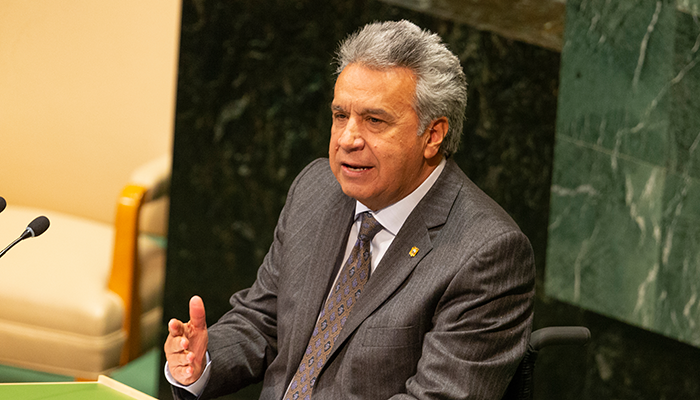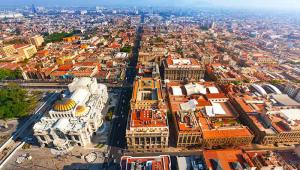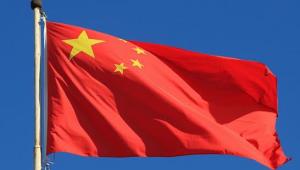For a man named after a Bolshevik revolutionary who changed history, Lenín Moreno is surprisingly conservative.
The father of Ecuador’s president idolised the leader of the Russian Revolution and, like many on the Latin American left, dreamed of a similar transformation in his own society.
Moreno has turned out to be quite the rebel – but of a very different kind, dramatically reversing the socialist policies of his predecessor and erstwhile friend, Rafael Correa, and earning the hatred of the left in the process.
His U-turns were given symbolic force in February when Ecuador signed a $4.2bn loan agreement with the IMF.
There is no doubt that Moreno will be remembered – albeit most probably for withdrawing asylum from the WikiLeaks co-founder Julian Assange, who was arrested by British police this week in Ecuador’s London embassy.
An unusual politician who served under Correa as vice-president from 2007 to 2013, Moreno has also been something of an icon for the disabled as the world’s only head of state in a wheelchair.
Paralysed after being shot during a robbery in 1998, he become an advocate for disabled people globally and in 2012 was nominated for the Nobel Peace Prize.
His popularity helped him to become president in 2017 as candidate of the ruling centre-left Alianza PAIS party, narrowly defeating an openly neoliberal opponent.
This victory was greeted with relief on the left as a welcome finger jabbed in the dyke of progressive governments across the region that were struggling to hold back a rightwing resurgence.
After all, during Correa’s 10-year rule from 2007–2017 Moreno had readily embraced his so-called “Citizens’ Revolution” that represented a rejection of previous neoliberal reforms and was characterised by extensive social policies.
Correa’s tenure was marked by progressive constitutional change enshrining social and environmental rights in law and re-establishing the role of the state in development.
His government invested heavily in public infrastructure – from major road and energy projects to schools and health centres – and reduced the country’s reliance on unpredictable oil revenues by reforming tax collection.
These policies boosted fiscal revenues from a tax to GDP ratio of 12% in 2006 to a high of 21% in 2015 and – more importantly, reduced the proportion of the state’s general budget funded by oil (about 30% on average, but as low as 13% under Correa).
This was no mean feat, earning Ecuador plaudits in confronting the notorious “resource curse” that affects so many oil-rich developing nations.
Extensive social policies tripled between 2006 and 2016 the low rates of per capita growth that Ecuadoreans had hitherto become wearily used to, and between 2007 and 2016 the poverty rate fell from 37% to 23%.
Moreover, Correa used language that was music to the ears of traditional leftwingers, adopting a confrontational approach to both the IMF and World Bank, criticising the neoliberal policies of the past, and adopting a radical foreign policy that snubbed the US – one sign of which was the decision to grant asylum to Assange.
It was, therefore, as a continuity candidate that Moreno was elected – but once in office he swiftly changed direction, sparking a bitter feud with Correa.
Aside from now surrounding himself with the country’s most powerful business leaders and engineering controversial political reforms designed to prevent the return of his predecessor, Ecuador’s new president distanced himself dramatically from Correa’s “erratic” policies and accused him among other things of breaking laws on public debt.
His economic policies have since shifted in a traditionally rightwing direction, aimed at liberalising trade, weakening labour laws, imposing austerity, and reining in the redistributive agenda.
Among other things, the Moreno government has capped public spending at 3%, made privatisations easier with generous subsidies, and embraced an international investor-state dispute settlement system for foreign investors.
As if to confirm this policy rupture, Moreno signed February’s $4.2bn loan agreement with the IMF which, not surprisingly, has enthusiastically backed his plans to cut debt and increase productivity by curbing public spending.
The move opens the door for Ecuador to receive an additional $6bn in loans from other multilateral institutions – pushing the country’s debt back up despite the accusations made against Correa.
The jury is still out on Moreno’s counter-revolution.
Initially wary of him, investors quickly warmed to Ecuador’s new president – while bemoaning the clumsiness of some of his policy measures: his accusations against Correa, for example, may have weakened their confidence in the country’s ability to service its debt.
Moreover, official statistics suggest poverty – almost a quarter of Ecuadorians are classified as poor and almost one in 10 lives in extreme poverty on less than $50 a month – is creeping back up.
Recent polls show that Moreno’s popularity has been in rapid decline as Ecuador’s economy flags – it is likely to contract by 0.5% this year, according to the IMF, as it struggles with a wide fiscal deficit and a hefty foreign debt
Perhaps, then, Moreno’s legacy will eventually be more likely to reflect the middle name given to him by his mother, who loved Voltaire – author of the satire Candide, ou l'Optimisme, which traces the process by which its indoctrinated protagonist slowly becomes disillusioned.
And it does not bode well that an error in the civil registration at the time turned Moreno’s middle name into Boltaire.









